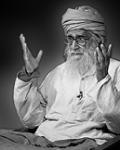ASK MAULANA
Your Questions Answered
Maulana Wahiduddin Khan in Interaction with Centre for Peace and Spirituality Team
Q: Maulana, you say that dishonest people will not go to Paradise. What is dishonesty to God?
A: Dishonesty is hypocrisy. It is not to act according to what your heart regards as true while pretending that you are acting according to it.
Some study God’s Book and the life of the Prophet and act according to what they find therein. Others may not fully act according to what they have learnt but repent for this. They admit their weaknesses and accept they were wrong. They do not conceal their reality. They keep doing dua to God. If God wills, these people will be forgiven by Him. But God will not forgive those who knew the Truth but did not follow it and, yet, at the same time, made a show of following it. This is what is called hypocrisy, and for hypocrites there is no forgiveness from God.
Q: How do we inculcate contentment?
A: According to a hadith report, the Prophet said: “Look at those who are lesser than you and do not look at those who are higher than you. That is more likely to prevent you underestimating the blessing of God on you.” (Bukhari)
There is a very simple method for this. Do not compare yourself with someone above you. If you do that, you will develop discontentment. You will think, ‘He has so much, and I have so little. He has such a big house, and the house I live in is so small. He has a fancy car, and I have just an ordinary one.’ That will make you miserable. Instead compare yourself with people below you, to develop contentment. You will realise how much better off you are than others, and this will make you contented.
Q: What is the real sign of modesty?
A: It is very difficult to recognise genuine modesty. People show themselves to be very modest, but the reality is different. You can find out the reality of someone when they are tested. At such moments, people’s masks fall off and they show themselves to be as they are.
A man once went to a ‘saint’, who was famed for supposedly being exceedingly modest, and asked him a question. The ‘saint’ replied, ‘I know nothing. What can I say?’ The man responded, ‘Yes, sir, really you know nothing at all!’
And do you know how the so-called saint reacted? He burst out in anger! He could not stand someone telling him that he was ignorant! So much for his modesty! When he was tested, he revealed his true self.
People are adept at acting. But if you live with someone for some days, you can realise what they truly are.
Once, a person praised someone before Umar ibn al-Khattab, saying that that person was very modest, very nice. Umar asked the person if he had had any dealings with him. He replied that he had not. Umar then asked him if he had ever travelled with the person he was praising. Again, he replied that he had not. Then, Umar told the person that he knew nothing about the man whom he had been praising and that he must have only observed him standing up and sitting down in the mosque.
You know a person’s reality when he is put to a test. Standing up and sitting down is not a test of someone’s character! Prostrating before God in a mosque is not a test. The test is when you have to bow before a fellow human being. Remember this: Satan used to bow before God. He did not bow before Adam. From this I learn that man’s test is not in bowing before God, but in bowing before other human beings.
If you want to know how a person truly is—modest or whatever—spend some days in his company, or observe him when he faces a test.
Q: Many young people today are mainly concerned with earning name and fame. They think that if at all they will think about spirituality, it will be only after they have ‘achieved it all’.
How do we reach out to such people?
A: This is not a new issue. It has always been there. The Quran says: “Truly, you love immediate gain.” (16: 20)
People think that immediate gain is everything, and they are all running after more money. This money-culture or materialistic culture has always been there. It isn’t something new. The only difference, I think, is that earlier people wanted many horses, and now they want many cars.
According to the Quran, this mindset has always been there—giving most importance to material wealth, running after material gain. So, the method that was used when the Quran was revealed should be used today, too. We don’t need to invent any new method. The people whom the Quran addresses—they were told that their race to hoard money was useless. Death will overtake us some day. Just today, I was thinking of this politician who established a multi-crore empire and was shot dead. He wasn’t very old. And his son is in the intensive care unit in a hospital, hovering between life and death.
Ask them what they have gained from this race for name and fame. Ask them what they have got out of all the money and fame they have earned. The Quran says: “Greed for more and more distracted you till you reached the grave.” (102: 1-2)


